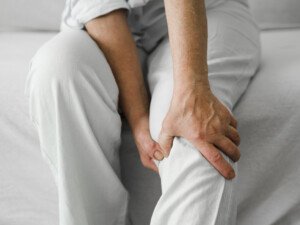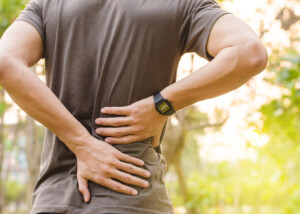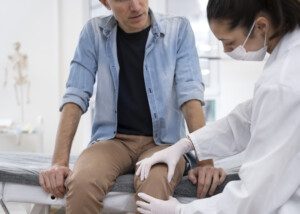A physician cites three possible causes of knee pain following hip replacement surgery.
“Knee pain after hip surgery is a poorly-understood phenomenon,” says Devin B. Peck, MD, owner of Austin Interventional Pain in Austin, TX.
“A small retrospective study examined 13 patients who’d had hip replacement,” continues Dr. Peck. “Eight of the patients reported knee pain after the surgery.”
Three Possible Causes of Knee Pain after Hip Replacement Surgery
Dr. Peck explains, “Biomechanical measurements before and at six weeks after surgery [in the aforementioned study] did not demonstrate significant differences.
“Reasons for this phenomenon remain unclear, but may include changes in gait and leg length, and elimination of a greater pain-generator (hip), leading to more noticeable discomfort in the knee.
“Patients with severe hip osteoarthritis may develop a gait abnormality, known as Trendelenburg gait, due to weakness in the hip abductor muscles.
“This gait can lead to uneven pressures across the knee joint, and resulting arthritis in that joint.”
Hip abductor muscles are located on the outer side of your hips and are primarily responsible for moving your leg away from your body’s midline.
Solutions to Knee Pain Following a Total Hip Replacement Surgery
“The best way to optimize outcome after any joint surgery is to optimize preoperative conditioning,” says Dr. Peck.
This means “participation and compliance with a formal PT program along with home exercises (very important!).”
If the patient has excess body weight, then losing this weight will also help relieve some of the pain, since the knee, being the most unstable joint in the entire body, is very sensitive to excess body fat.
Hence, even a 10 percent weight loss will yield some improvement in the way this joint feels.
The patient may believe that fat loss is impossible due to limitations in the ability to use the lower body.
However, upper body strength training exercises will facilitate fat loss.
By engaging in these exercises, you build lean muscle mass, which increases your overall metabolism.
This enhanced metabolic rate helps your body burn more calories, both during exercise and at rest.
This loss of body fat is so important for anyone who’s struggling with knee pain following surgery of the hip.
And of course, consuming fewer calories will get weight loss going.
This deficit forces your body to burn stored fat for energy.
Consuming fewer calories begins with replacing soda with water; juice with whole fruit; more home cooking and less fast-food, and mindful eating: the avoidance of eating for reasons other than hunger, such as when watching TV or using the computer.
Remember, even a 10% weight loss can improve knee discomfort that has resulted from a hip surgery.
Upper Body Strength Training Exercises
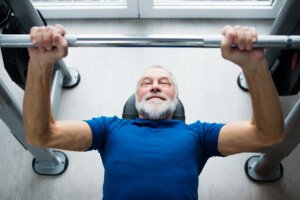
Shutterstock/Halfpoint
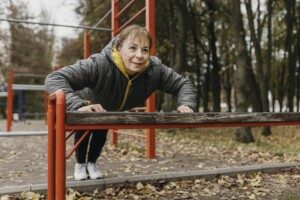
Freepik

Freepik

Shutterstock/Microgen

Freepik
 Dr. Peck’s areas of interest include chronic and acute musculoskeletal pain, sports injuries, arthritis and cancer pain, among many others. Austin Interventional Pain was established in 2019.
Dr. Peck’s areas of interest include chronic and acute musculoskeletal pain, sports injuries, arthritis and cancer pain, among many others. Austin Interventional Pain was established in 2019.
 Lorra Garrick has been covering medical, fitness and cybersecurity topics for many years, having written thousands of articles for print magazines and websites, including as a ghostwriter. She’s also a former ACE-certified personal trainer.
Lorra Garrick has been covering medical, fitness and cybersecurity topics for many years, having written thousands of articles for print magazines and websites, including as a ghostwriter. She’s also a former ACE-certified personal trainer.
.

